THE AGENT AND FIRST ADJUSTMENTS.
Page 22

Page 23

If you've noticed an error in this article please click here to report it so we can fix it.
How Far Should an Agent be Expected to Go In Effecting Adjustments at His Own Expense to a Newly-delivered Vehicle ?
By "Vim."
OF ALL the questions that affect the relationship between manufacturer, agent, and user, there is none more deserving of discussion than the one which forms the sub-heading to'this article. Mr. L. M. 45eabrooke, speaking on behalf of a well-known firm of manufacturers, brought it forward in The Commercial Motor of May .18th, and I trust that it will not be allowed to drop until 80112 e fairly definite understanding has been arrivedat. It so intimately. concerns us all that other sales managers, besides Mr. Seabrooke, ought not to let slip the opportunity to expound their views on the subject, and other traders, besides the obscure writer of these present remarks, should explain their ideas on it. As to users, I take it that they will be content with any decisions that may be reached, so long as they are not bothered with bills arising out of the cost of putting their new vehicles into Satisfactory running condition.
Where Does the Dividing Line Come ?
We will begin by taking as our text Mr. Seabrooke's statement that "the manufacturer . . . does not want alament from the agent-over every little adjustment. It is up to the agent to attend to these small details as a matter of routine and sound policy." As it stands, this is an absolutely right attitude for a manufacturer to adopt and for an agent to accept. The point to beesettled between them is where "small adjustments" end and big ones commence. . During the first month or soof a new vehicle's active life it invariably happens that adjustments become necessary. Particularly, is this the case where P.36 a chassis only has been purchased from the manufacturers and a body fitted locally. A chassis cannot be tuned up properly without its regular body in position, irrespective of the fact that standing about in a coachbuikler's shop encourages control movements to stickup-and similar minor defects tee develop. , After a preliminary canter of a hundred miles it is a moral certainty that the driver of a new van or lorry will 'discover that one or -both brakes bind, petrol cone sumption is unduly heavy, the clutch slips, or some-. thing of the sort happens. This will occnt repeatedly, until every part • gets thoroughly bedded down and the driver has become. completely au fa,it with his vehicle; and, on each occasion, back he -will come to the agent's repairs shop to have the defects remedied. The agent does not mind this a bit—not if he is a sensible chap. Indeed, he would rather the driver did not do any experimenting on his own account, because, while he is. prepared -to accept responsibility for work done under his foreman's eye, he has a strong objection to being saddled with consequential derangements set up by other people. The businesslike agent is aware that the sole justification for his taking.profit as an intermediary between. maker and user is his ability to facilitate distribution, which, in connection with motor vehicles, depends on his willingness to act as "man on the spot" to both the remaining parties to the deal.
But the whole thing is a business transaction. That must not be forgotten. Mechanics' time and over' head charges cost money, and lots of it. If the agent is to fork out of his own pocket for every blessed thing that happens to a new vehicle, so as to please his customers and keep the hair brown on the heads of his manufacturer's gentlemen, he might just as well shut up shop and smoke his pipe until the broker's men arrive, as take the trouble to go to his office every morning and lose over it. While human hands are employed in building motor chassis there will never be a perfect one made, or even a batch of really good, chassis turned out that does not contain a, few a little below average. Manufacturers will hardly believe this, but it is true. You may take the very finest types built, ar-yet come across examples which do not, at first, come quite up to the mark, and which require a deal of attention to bring them to that state.
"Small. details" probably have dissimilar meanings to manufacturer and to agent. To the former they mean any adjustments that are in themselves of a trivial'nature ; to the latter they mean the time occupied in effecting them. Thus, while the shief consideration to the agent is the aggregatecost of first adjustments to a chassis, the manufacturer, no doubt, values them according to their individual magnitude. A mass of small details comes to the same thing, looking at the question from the agent's standpoint, as one big job that the manufacturer would accept under guarantee without hesitation. Have I made the difference clear? If I have, then manufacturers will be able to appreciate the reason why an agent sometimes writes to complain about the careless testing of a chassis, which has necessitated his carrying out various adjustments, duly enumerated, and asks who is going to pay for them. That agent is not a churlish dog who delights in picking holes in other folks' work ; he is merely fed up with spending more than a legitimate .proportion of his gross profit on the sale in sustaining. his and the maker's reputations. • He would more cheerfully have stood the cost of fitting, say, new gears, than the cost of the constant tinkering which the chassis has needed.
Broadly, cost is the principle which manufacturers must be ;guided by when weighing the claims of agents to reimbursement for services rendered to purchasers. It is useless to say: Our agents should
be willing to do ais, but we eannot expect them to do that. In fact, it is impossible fo lay down any hard and fast rules at all—unless (and it seems to me that there is some prospect of finding a solution to the problem in this way) a fixed allowance in terms of money could be decided on, and, if the first adjustments exceeded it, the agent should have the right to call ton. the manufacturers to stand the excess.
The Amount of a Suggested Allowance to Agents.
To suggest how much money an agent should be prepared to pay out in giving, a user service, without asking the manirfacturer to bear his share, would be no easy task, even if I did not -feel some diffidence in speaking for my fellow-traders on such a, vital point. About £5 would, I fancy, be a reasonable maximum. Any chassis that required more adjustments and tuning than is represented by a fiver could not have been in proper condition when passed by the works, and, therefore, the maker should meet the expense of making it so. At current wages, the sum mentioned, is soon swallowed up, and will not cover unlimited attending to "small details" ; but it is about as much as the profits on most sales will bear, after deducting overhead charges for showrooms, advertising and the like. I appeal to manufacturers to rid their minds of the notion that when an agent complains he does so out of perverseness. Very few have time for superfluous letter writing. It inlay be that 'their communications are occasionally couched in language more forcible than polite ; but it must be remembered that they often have to write in the heat of the moment, and that generally their grievances are perfectly genuine. Theymay, perhaps, wax sarcastic; but although this mode of getting one home is silly, it does not alter the reality of their case. A prompt answer, giving practical evidence of interest, turneth away that kind of wrath, which (I whisper it) may usually be traced to past experience of the difficulty of getting a manufacturer to believe for a moment that any person displeasedwith his wares is not either an ignoramus or a deliberate fault-finder.




























